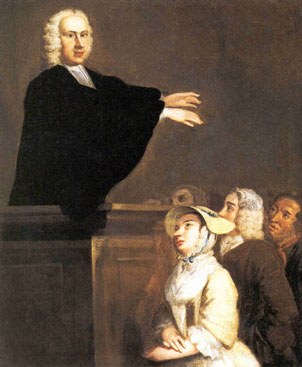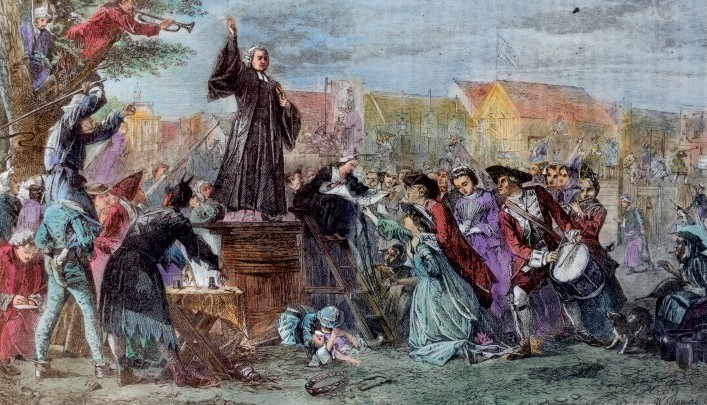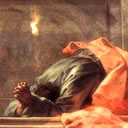George Whitefield
George Whitefield was born in England in 1714. As a child, Whitefie ld loved acting and he mimicked the preachers whom he heard. Though his early education was spotty because of his family’s financial troubles, in 1732 he began attending Oxford University. There he met Charles Wesley, a devout Anglican student who encouraged Whitefield toward devout Christianity. Whitefield joined the “Holy Club,” led by Charles’s brother John. The club was a gathering of students dedicated to prayer, fasting, and other spiritual exercises called “Methodists” because of the methods they used to promote personal holiness. These young men both deepened on their spirituality and, with Whitefield and the Wesleys at their head, created the Methodist movement.
ld loved acting and he mimicked the preachers whom he heard. Though his early education was spotty because of his family’s financial troubles, in 1732 he began attending Oxford University. There he met Charles Wesley, a devout Anglican student who encouraged Whitefield toward devout Christianity. Whitefield joined the “Holy Club,” led by Charles’s brother John. The club was a gathering of students dedicated to prayer, fasting, and other spiritual exercises called “Methodists” because of the methods they used to promote personal holiness. These young men both deepened on their spirituality and, with Whitefield and the Wesleys at their head, created the Methodist movement.
Whitefield was ordained after receiving his BA. He immediately began preaching, but he did not settle as the minister of any parish. Rather he became an itinerant preacher and evangelist. Just as the Wesleys had done earlier, Whitefield made his first trip to North America in 1738, traveling to the newly established colony of Georgia. There he conceived the idea of establishing an orphanage, which he named Bethesda. For the rest of his life, Whitefield raised money for the orphanage.
After he returned to England, Whitefield’s preaching became increasingly popular. Whitefield preached in a dramatic style that crowds loved; he engaged, for example, in imagined conversations in the pulpit. His detractors said that he was more of an actor than a preacher. His voice was powerful, which was a necessity to reach the large crowds that gathered to hear him. He preached in established churches whenever he could, but he often resorted to preaching outdoors when he could not find a cooperating church or when the audience was too large. For most of his life, Whitefield preached multiple sermons every day of the week. And Whitefield, like the other Methodists, sought out groups of people whom other ministers had passed over, such as miners in Britain or slaves in Georgia.
Whitefield’s preaching wasn’t different just because of his style; his message was different too. Where other Anglican ministers emphasized religious ritual or moral living, Whitefield preached conversion. To experience a new birth through the Holy Spirit and to have a personal salvation, His hearers must be inwardly changed through faith in Jesus Christ. Whitefield preached that conversion and regeneration could be experienced in an instant,, if only people would repent and believe.
As he grew increasingly popular, Whitefield also became increasingly divisive. Many established ministers thought he was wrong to emphasize conversion and that his style was too flamboyant. They accused him of being an “enthusiast,” that is, someone who injured the dignity of preaching and illegitimately claimed revelation from God. Whitefield in turn was unsparing and sometimes uncharitable in his attacks on other ministers, whom he accused of being ignorant of the gospel and of serving Satan. These disputes began to create a division between evangelicals like Whitefield and mainstream Anglicanism. Whitefield also broke with his fellow Methodist John Wesley over a theological argument that led to a personal rift, and the Methodists separated into two camps.
 In 1739 Whitefield returned to the colonies for what would become the most important preaching tour of his life. At the same time that he raised money for the Georgia orphanage, Whitefield preached throughout the colonies, from New England to Georgia, in a trip that lasted over a year. He held meetings both in the open air and at whatever churches would invite him. The trip was well publicized, for Whitefield arranged for newspaper coverage and wrote many pamphlets and sermons on his journeys, thereby harnessing the power of the press for the sake of revival. Consequently, Whitefield preached to tremendously large crowds, including some gatherings that numbered in the tens of thousands.
In 1739 Whitefield returned to the colonies for what would become the most important preaching tour of his life. At the same time that he raised money for the Georgia orphanage, Whitefield preached throughout the colonies, from New England to Georgia, in a trip that lasted over a year. He held meetings both in the open air and at whatever churches would invite him. The trip was well publicized, for Whitefield arranged for newspaper coverage and wrote many pamphlets and sermons on his journeys, thereby harnessing the power of the press for the sake of revival. Consequently, Whitefield preached to tremendously large crowds, including some gatherings that numbered in the tens of thousands.
What made Whitefield’s preaching tour so important was that it came during the height of several local revivals. In New England under Jonathan Edwards, in Pennsylvania and New Jersey under William and Gilbert Tennent, and in Virginia under Samuel Davies, these awakenings led to many converts. Whitefield preached alongside each of those ministers. It was the shared experience of Whitefield’s preaching, both by the tens of thousands who attended his services and the even wider audience that read about them in newspapers and pamphlets. That made a series of scattered, local awakenings into the Great Awakening.
On his return to Britain in 1741, though his popularity was waning, Whitefield continued his preaching ministry. Many churches were closed to him because of his attacks on the Anglican clergy, so he preached in the open air and established a chapel for himself in London.
Whitefield sailed again for the colonies in 1744. The fires of the Great Awakening had cooled, but Whitefield was able to stir them up again, albeit not as successfully as during his earlier tour. As in Britain, he found an increasing number of churches closed to him by ministers who opposed the Awakening. Whitefield also continued to raise money for Bethesda. Regrettably, in trying to support the orphanage permanently, Whitefield accepted the donation of some slaves and bought some of his own. Those slaves were set to work on a plantation in Georgia, and the income went to the orphanage. Whitefield had earlier been mildly opposed to slavery, but thinking only of his orphanage, he became both a practitioner and defender of slavery. Evangelicals who were his contemporaries were beginning to have grave doubts about slavery and even beginning to oppose it outright. The evangelicals would later lead the antislavery movement.
In 1748 Whitefield returned to England. He became the personal chaplain to Selina Hastings, the countess of Huntingdon and a prominent patron of evangelical ministers. As Whitefield aged, his health grew worse. Still, he continued to preach multiple times each day, traveling throughout England, Ireland, Scotland, and several more times to North America.
Whitefield returned to the colonies in 1769 for the final time. He unsuccessfully pursued plans to found a college at Bethesda. He also took up the political cause of the colonies, which by that time were engaged in disputes with imperial Britain. During another preaching tour, Whitefield died in Newburyport, Massachusetts, where he was buried in that town’s Presbyterian church.
Whitefield was a man with a remarkable gift and a relentless energy for preaching. Though his zeal in preaching the gospel and converting faith in Christ sometimes led him into divisiveness, it also made him the most widely known and widely heard preacher in his day. For many people on both sides of the Atlantic, Whitefield’s sermons both in person and in print were the single shared religious experience that connected them to other people affected by the awakenings. Whitefield, more than any other man, turned a series of awakenings into the Great Awakening.

Taken from: greatawakeningdocumentary.com
 There is a voice of Truth which can be heard crying out! Whether lost or saved, we believe you will meet the living Christ through this ministry.
There is a voice of Truth which can be heard crying out! Whether lost or saved, we believe you will meet the living Christ through this ministry.